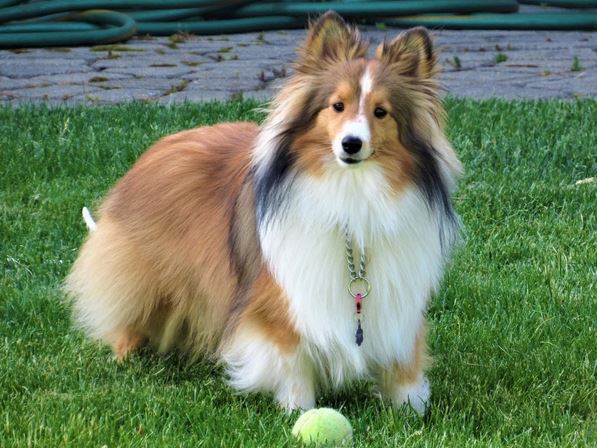Introduction to Mini Sheltie
Mini Sheltie are small bundles of joy wrapped in fur. These adorable little dogs combine the intelligence and loyalty of their larger Shetland Sheepdog relatives with a pint-sized frame that’s perfect for cuddling. If you’re lucky enough to have one, you already know how much love they can bring into your life. But caring for a Mini Sheltie requires more than just affection; it involves understanding their unique needs and characteristics.
In this ultimate guide, we’ll explore everything from daily care routines to grooming tips tailored specifically for these charming companions. Whether you’re a new owner or looking to enhance your current routine, you’ll find valuable insights to help your Mini Sheltie thrive. Get ready to dive deep into the wonderful world of Mini Shelties.
What Makes Mini Shelties Unique?
Mini Shelties, or Miniature Shetland Sheepdogs, are a delightful blend of charm and intelligence. Their compact size makes them perfect companions for both city dwellers and suburban families.
One standout trait is their striking appearance. With their long, flowing coats and beautiful coloration, they often resemble little lions with affectionate personalities.
What truly sets these dogs apart is their remarkable agility and energy levels. They thrive on playtime and enjoy interactive games that challenge their minds as well as bodies.
Moreover, Mini Shelties possess an innate desire to please their owners. This quality makes training easier compared to other breeds, resulting in strong bonds between the dog and its family.
Their loyalty shines through in every interaction. Whether they’re snuggling on the couch or herding imaginary sheep in the backyard, these pups bring joy wherever they go.
Daily Care for Your Mini Sheltie
Daily care for your Mini Sheltie is essential for their well-being. Start each day with a morning routine that includes fresh water and nutritious food. A balanced diet keeps them energetic and healthy.
Regular walks are crucial too. Aim for at least 30 minutes of exercise, which helps burn off energy while providing mental stimulation. Incorporate playtime to keep things fun—Mini Shelties love games!
Don’t forget about bathroom breaks throughout the day. Establishing a schedule can help prevent accidents indoors.
Also, make time for bonding through cuddling or light training sessions. These moments build trust and strengthen your connection with your furry friend.
Pay attention to their behavior as well; any sudden changes could signal health issues or discomfort. Keeping an eye on them ensures they remain happy and thriving in their environment.
Grooming Tips and Techniques
Grooming your Mini Sheltie is essential for maintaining their beautiful coat and overall health. Regular brushing, ideally three times a week, helps prevent matting and reduces shedding.
Use a slicker brush or an undercoat rake to reach the dense fur beneath the outer layer. This will keep their coat looking vibrant and shiny. Pay special attention to areas behind the ears and around the legs where tangles often form.
Bathing should be done every couple of months or whenever they get particularly dirty. Use a mild dog shampoo intended for subtle skin to avoid annoyance.
Don’t forget about nail trimming; this is crucial for your dog’s comfort. Aim to trim nails every few weeks, ensuring they don’t click on hard surfaces as they walk.
Check their ears regularly for dirt or wax buildup and clean them with a vet-approved solution when needed. Keeping up with these grooming routines promotes not just looks but also better health.

Exercise and Nutrition for a Healthy Mini Sheltie
Keeping your Mini Sheltie active is crucial for their well-being. These spirited dogs thrive on regular exercise. Aim for at least 30 minutes of daily activity to keep them happy and healthy.
Engage in interactive play sessions or take long walks around the neighborhood. Mini Shelties love agility training, so consider setting up a small course in your backyard. This not only provides physical stimulation but also helps sharpen their minds.
Nutrition plays an equally vital role in their health. Choose high-quality dog food tailored for small breeds, rich in protein and essential nutrients. Monitor portion sizes to prevent obesity; even little ones can pack on the pounds quickly.
Fresh water should always be available to keep them hydrated, especially after exercise sessions. Regularly consult with your veterinarian to adjust dietary needs as they grow or if any health concerns arise. A balanced diet paired with consistent exercise will lead to a vibrant and lively companion.
Training and Socialization for a Well-Behaved Mini Sheltie
Consistency is key when training your furry friend. Use positive reinforcement techniques such as treats or praise. This will help build trust between you and your dog.
Socialization is equally important for Mini Shelties. Expose them to different environments, people, and other pets early on. It helps reduce fearfulness and promotes good behavior in various situations.
Consider enrolling in puppy classes or obedience courses. These settings provide valuable experiences for both of you while refining their skills.
Remember that patience goes a long way during training sessions. Keep them short but engaging to maintain their interest. A well-trained Mini Sheltie not only brings joy but also makes everyday life easier for everyone involved.
Shared Health Anxieties and How to Stop Them
Mini Shelties are generally healthy, but like any breed, they can face specific health issues. One common concern is hip dysplasia. Regular vet check up and upholding a healthy heaviness can help alleviate this risk.
Another issue to watch for is eye problems such as cataracts or progressive retinal atrophy. Routine examinations by a veterinary ophthalmologist are essential for early detection.
Dental health shouldn’t be overlooked either. Small breeds often suffer from dental issues. Brushing your Mini Sheltie’s teeth regularly will promote good oral hygiene and prevent painful conditions.
Allergies may also arise in Mini Shelties, leading to skin irritations or gastrointestinal upset. A balanced diet with high-quality ingredients helps strengthen their immune systems, reducing allergy risks.
Staying informed about these potential concerns enables you to take proactive measures for your furry friend’s well-being.
Creating a Safe and Happy Environment for Your Mini Sheltie
Creating a safe environment for your Mini Sheltie is essential. These little furballs are curious and love to explore, so puppy-proofing your home is crucial.
Start by removing hazards like sharp objects or toxic plants. Ensure that any small items they could swallow are out of reach. A secure space allows them to roam freely without danger.
Designate a cozy area where your Mini Sheltie can relax. Soft bedding, toys, and their favorite blanket will create a comforting retreat.
Consider using baby gates if you need to restrict access to certain areas. This keeps them safe while still allowing them some freedom.
Regularly check the yard for potential dangers too. Fencing should be high enough to prevent escapes but low enough not to be intimidating.
Provide mental stimulation with interactive toys or puzzles designed specifically for dogs. Engaging their minds contributes greatly to their happiness and well-being.
Conclusion:
Caring for a Mini Sheltie is not just about meeting their basic needs; it’s about embracing the joy they bring into your life. These spirited little companions thrive on love, attention, and proper care. When you invest time in understanding their unique characteristics and requirements, you cultivate a bond that enriches both your lives.
From daily routines to grooming sessions and exercise playdates, every moment spent with your Mini Sheltie deepens that connection. Their playful nature encourages laughter while their loyalty offers unwavering companionship. You’ll find yourself swept up in their enthusiasm for life.
As responsible pet owners, it’s essential to prioritize health and well-being through preventive measures and regular vet check-ups. Providing a safe environment where they can explore fosters confidence and happiness.
